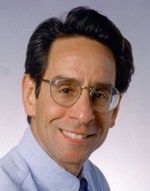Bio: Paul Siegel joined the Jacobs School faculty in 1995, and received his Ph.D. from MIT in 1979. From 1980 to 1994, he worked at the IBM Almaden Research Center. In 1994, he was named a Master Inventor, IBM Research. In 1997, he was named a Fellow of IEEE (cited for contributions to signal processing and coding for storage systems). Siegel is a former member of the Board of Governors of the IEEE Information Theory Society (1991-96), and was named Editor-in-Chief of the IEEE Transactions on Information Theory for the 3-year period beginning July 1, 2001. He became the director of UCSD's Center for Magnetic Recording Research in 2000.
Research: As director of UCSD's Center for Magnetic Recording Research, Professor Siegel oversees research activities on a wide range of issues related to digital data storage and communications. His primary area of interest is the mathematical foundations of coding, modulation and signal processing. He is an expert on 'turbo' coding and low-density parity check (LDPC) codes for state-of-the-art communication systems, error correction and data integrity in recorded media, and holds several patents in the area of coding and detection for digital recording systems. Siegel is also the leader in charge of the Networked Infrastructure 'layer' of the UCSD division of the California Institute for Telecommunications and Information Technology, Calit2, a joint venture of UCSD and UC Irvine. He also sits on the executive committee of the National Storage Industry Consortium. A mathematician by training, Siegel can speak clearly about the future of information storage as the size and cost of disk drives, compact discs and other magnetic media drop even faster than microprocessors. He is also an expert on the fundamental advances necessary to improve the quality of wireless transmission of voice, data and multimedia to sustain an expected explosion in sensors, personal digital assistants, laptops and 3G (third generation) wireless phones hooked up to the Internet information infrastructure.
|

